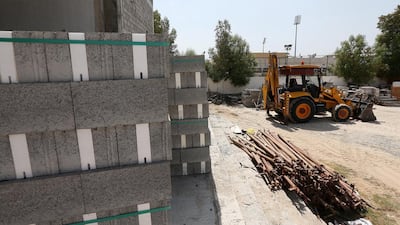Rising energy costs across the region are already affecting local manufacturers and could lead to more inflation in the building sector.
Bob Flanagan, the UAE managing director of project management and cost consultancy services at Colliers, has said that rising energy prices are feeding into increased input costs for a variety of manufacturers of building products, including cement suppliers, glass manufacturers, cladding suppliers, PVC cabling firms and even timber and joinery workshops.
“Basically, any construction material that is manufactured within the UAE will be affected by this,” he said.
The increase in energy prices was cited by building materials company Arkan as the reason for its decision to close its 43- year-old Emirates Cement Factory in Al Ain yesterday.
The company announced a restatement of its preliminary accounts for 2016 as a result of the closure. It said that a previously announced Dh75.7 million net profit declared in its unaudited results last month will now be reversed into a Dh82m loss due wholly to the fact that it has written off the value of the plant from its balance sheet.
Arkan has shifted production from Emirates Cement Factory to its nearby Al Ain Cement Factory – a Dh1.3 billion facility that opened in November 2014. The move will lead to an annual cost saving of Dh45m, it said. The Al Ain Cement Factory is now running at almost full capacity.
“This one-off book loss doesn’t change the fundamentals of Arkan business and we are actively exploring ways to dispose of the plant in the near future and realise the highest value possible,” said Jamal Al Dhaheri, the chairman of Arkan.
Cement production, which is an energy-intensive process, accounted for 72 per cent of Arkan’s sales in the first nine months of last year. In December, the company said it was facing a 73.3 per cent rise in the price of gas used to fire its kilns. Its total power bill was set to increase by just over 56 per cent, the company said.
Yet despite higher input costs, Mr Al Dhaheri said that the company is “looking forward to maintaining our leadership position in 2017 by being the lowest cost producer in the segment”.
He said that Arkan’s cement operation generated an operating profit of Dh133m last year off sales of Dh613m, despite the Al Ain plant being closed for four months last year after it was damaged by a storm.
A report published by Colliers in January stated that cement costs increased by 3 per cent year-on-year to the end of September 2016 and the cost of concrete blocks climbed by 6 per cent. Other locally produced materials such as aggregates and sanitary ware also subject to price hikes.
Inflation in building materials prices has largely been kept in check for the past two years, helped in some instances by a weaker commodities market that has led to prices of imported materials such as steel and copper to drop sharply.
And although the slow market for contracting in Abu Dhabi means that local construction firms many not be able to increase their own margins, they are likely to have to factor in rising costs, according to Mr Flanagan – not least with the onset of VAT from next year.
“On top of that, in some of the markets around the world prices are increasing. For example, material prices are increasing significantly in America and any of those goods that are imported to here will have an effect.
“There will be an inflationary factor going into 2018. These are low single-figure inflation prices – you’re not talking about a 9 per cent increase. For the short term, there is nothing out there that will affect the UAE market in an extreme way.”
mfahy@thenational.ae
Follow The National's Business section on Twitter


